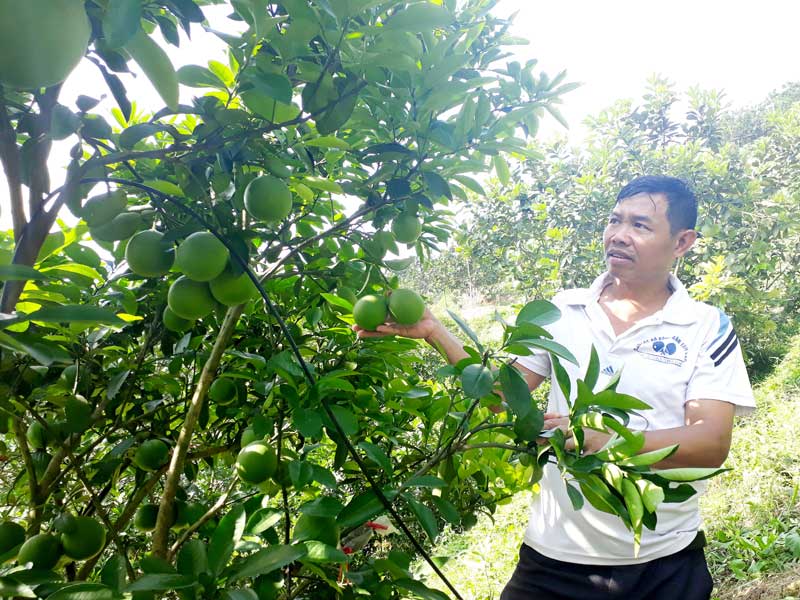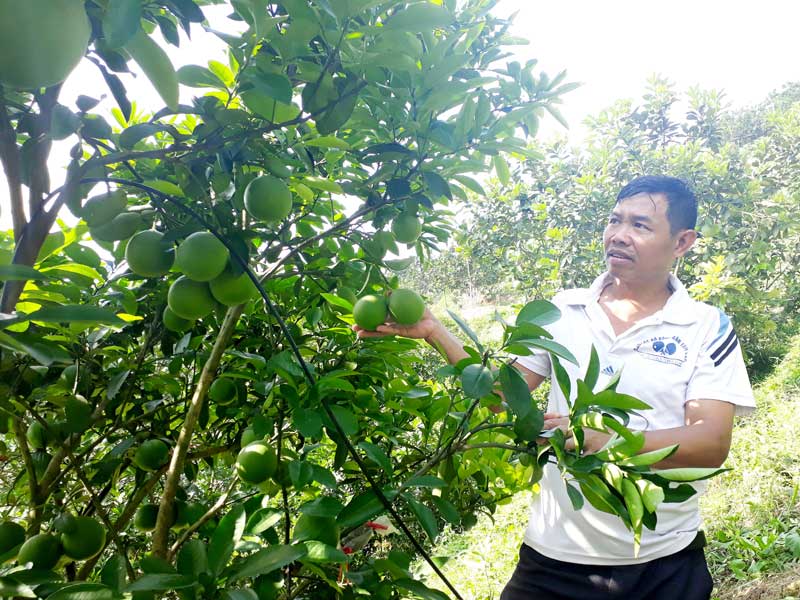
(HBO) – There is no doubt that the old barren hills are now being covered with the green of grapefruit trees. If Mr. Pham Khac Thuong had not pioneered with the "strange work" of taking red grapefruit up to the hill, perhaps, those slopes would be still now acacia planted. With the desire to bring red grapefruit further, He led the investment in machinery for preliminary processing, packaging products, etc.

Mr. Pham Khac Thuong, Hamlet 3, Tu Ne Commune
(Tan Lac) has been successful in bringing red grapefruit to the hill.
In order to carry red grapefruit up to the
hill, Mr. Thuong and his family had to excavate the hill, invest in building
water tanks for irrigation. The investment sum for 3 hectares of planting
grapefruit was very large; he and his wife had to borrow from the bank. And
then, it was not useless, the grapefruit grew day by day. After 2 years, then 3
years, the hills were covered with green color. During the time of planting,
caring, waiting for picking fruit, Mr. Thuong grafted branches for breedling
sale. Thousands of stems sold to the market have helped him earn income for
long planting. Now, his grapefruit garden has turned to six years old and
brings the sweet fruit beyond the expectation. Last year, the grapefruit garden
was abundant of fruit; the family of Mr. Thuong has collected more than 700
million VND.
Besides a grapefruit garden in village 3, Mr.
Thuong also invested in growing 1 hectare of red grapefruit and 2 hectares of
yellow orange in Cu village (Tu Ne). So far, the garden has been 2 years old
and being well developed. To take the best care of grapefruit garden, Mr.
Thuong has invested in automatic sprinkler irrigation technology.
"Grapefruit is not a soil picker, however, it is necessary to ensure the
water supply to keep soil moisture." Compared to grapefruit in lowland
areas, grapefruit on low canopy, the trees are smaller, fruit is also smaller.
Since bringing grapefruit to the hill, Mr.
Thuong has created regular jobs for many local workers. With the desire to
bring Tan Lac red grapefruits outreach with its own brand name and bringing
long-term economic effect, in 2017, Mr. Thuong and some grapefruits growers
cooperated together to set up a Production Cooperative to produce, process and
consume red grapefruits of Tan Lac. Currently, the cooperative has 9 members;
the total area of planting grapefruits is 30 hectares.
According to data from the Hoa Binh Provincial Party Committee, the industrial production index for the first six months of 2025 is estimated to have increased by 20% compared to the same period last year. This marks the highest year-on-year growth rate for this period since 2020.
In the first six months of 2025, Hoa Binh province’s export turnover was estimated at 1.145 billion USD, marking an 18.11% increase compared to the same period in 2024. Import turnover was estimated at $ 804 million, a 17.15% increase, which helped the province maintain a positive trade balance.
The lives of the ethnic minority farmers in Tan Lac district have gradually improved thanks to the new directions in agricultural production. This is a testament to the collective strength fostered through the professional associations and groups implemented by various levels of the district’s Farmers’ Union.
With the motto the "product quality comes first,” after nearly one year of establishment and operation, Muong village’s Clean Food Agricultural and Commercial Cooperative, located in Cau Hamlet, Hung Son Commune (Kim Boi district), has launched reputable, high-quality agricultural products to the market that are well-received by consumers. The products such as Muong village’s pork sausage, salt-cured chicken, and salt-cured pork hocks have gradually carved out a place in the market and they are on the path to obtaining the OCOP certification.
In the past, the phrase "bumper harvest, rock-bottom prices" was a familiar refrain for Vietnamese farmers engaged in fragmented, small-scale agriculture. But today, a new spirit is emerging across rural areas of Hoa Binh province - one of collaboration, organisation, and collective economic models that provide a stable foundation for production.
Maintaining growing area codes and packing facility codes in accordance with regulations is a mandatory requirement for agricultural products to be eligible for export. Recently, the Department of Agriculture and Environment of Hoa Binh province has intensified technical supervision of designated farming areas and packing facilities to safeguard the "green passport" that enables its products to access international markets.



